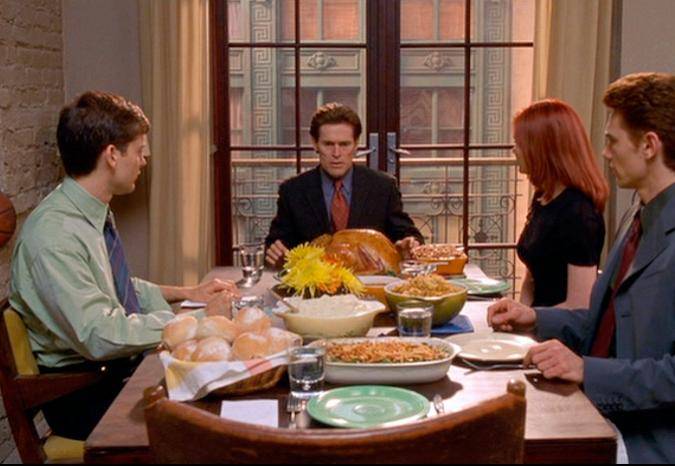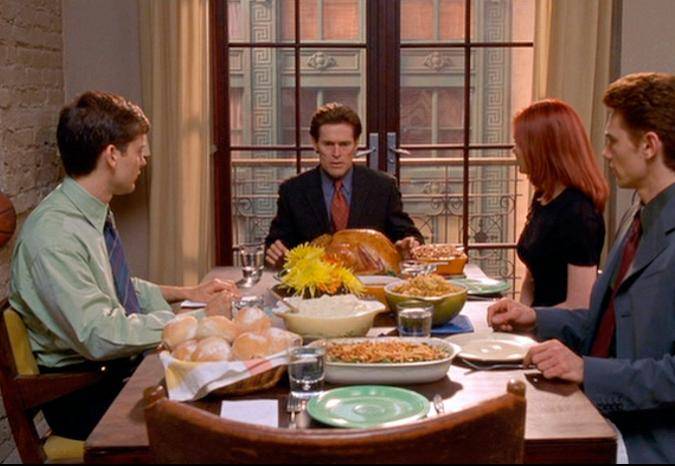Politics, Cranberry Sauce and the Toxicity of Silence During Thanksgiving


Politics, Cranberry Sauce and the Toxicity of Silence During Thanksgiving
by Matthew Erman
When I grew up, politics were not discussed around the dinner table — not because it was taboo, but because I don’t think my family cared. I grew up in time when there was only one 24 hour news network (CNN) and my family didn’t watch it too much, instead we spent most of the time watching Wacky Racers or Back to the Future (Snidely Whiplash and Biff were the only people I had a strong opinion of when I was a kid) — the political affiliations and opinions weren’t important. We were a lower-middle class family in rural-suburban Ohio in a neighborhood “lovingly” nicknamed “Little Kentucky.” We were simple and enthusiastic about Thanksgiving as a day of rest and family.
This year couldn’t be more different though — in a time where 24 hour news media exists in cable packages and our connectedness to both each other and a world where consciousness is instantaneous, people’s opinions are both more present and intense. Whether that’s a symptom of something I can’t say, but everyone has a megaphone now and it’s hard to listen.
Many of you will be traveling home and many are not (probably for political reasons) or maybe you just hate the food…but regardless I’ve been through this — I have outrageously different political views from my family and here’s the beautiful thing, I wouldn’t have it any other way.
It’s taken me a long time to get to this point, and I can safely say that I’ve been through the Kubler-Ross Model for Grief more times than I can count and after having circled back around from Acceptance to Anger a few too many times but this past year I feel like I’ve finally found my calm.
Thanksgiving is an opportunity to release ourselves from the sounding boards of social media — whether you’re touting the merits of our new President-elect or lamenting the struggle of the Native communities of North Dakota, raising your fist with Black Lives Matter movements or wondering if you’ll be able to visit the Great Wall of Trump once it’s built — Thanksgiving is a day where you can travel to a comfortable place and engage with people who share widely different world views. It’s a day to learn and be thankful that we are not all the same.
Anecdotally, my father and I have very different political opinions — and for a long time it bothered me. How could this man that raised me and taught me to be a person, a kind and thoughtful human — how could he be so wrong? That’s how I felt for a long time, that he’d gone astray, that his thoughts and feelings were rooted in some brainwashing and I was both angry and frustrated and I stayed silent. That silence festered for a long time until it came out in some unhealthy ways.
What helped my relationship with him and truly the world at large was a concerted effort to challenge him. I know that’s not possible or realistic for some people but the fear to do so stemmed from being a “child” in the “presence” of an “adult.” Once I realized that hey, I’m an adult too — things opened up, for me at least.
I think silence is toxic — it’s uncomfortable to speak up and say something, especially if it matters to you and it’s easier to get red in the face, squirm in your chair and wonder whether you’re going to have a piece of pumpkin pie afterwards. It’s simple and thoughtless, and maybe at the end of the night you can retire and move on. I’d say you’re doing yourself a disservice but your family as well. So? How do you manage to be both confrontational but respectful? I’ve been doing it for the past decade so let me try and give some tips:
- Ask simple questions — this is really important. When your uncle says aloud, “I believe cats should not live in the same house as dogs, it’s a graven sin.” You should just simply ask, “That’s really interesting! How’d you come to feel that way?”
- Resign that you will never be able to change someone’s opinion, and at best you can simply give them an alternative way to look at something. This is the stark reality of “discourse” — it’s not meant to change someone’s thoughts, but to understand where two different parties come from and in a perfect world, give some rationale to a side they may not understand.
- You always have a fallback topic, the food. If things go sour and your family is getting uncomfortable because you and your family have decided that all books where a major character is an animal need tossed in a fire then just say something about the mashed potatoes. Everyone can agree on mashed potatoes.
- Finally realize that these people aren’t going anywhere (barring some turkey related explosion) — they don’t want to go anywhere and no one wants to see family pushed away. Sometimes it is an unfortunate end-result at heated arguments over creamed corn, and sometimes it is legit, toxic feelings that blossom from a lack of understanding. Empathy is learned and it is born from the intermingling of differences.
I think that’s all. I think that you should be happy and merry and combative, liberal or conservative, gay or straight — you should help others understand your point-of-view thoughtfully and if you can’t articulate why you feel a certain way; take a step back and listen to why someone else feels the way they do — it’s good for society. It’s good for your family, and most importantly, it’s good for you.
As an aside, the picture I used for this article is from a scene from the first Spiderman movie by Sam Raimi — it’s a great, weird look at a modern family’s Thanksgiving experience post turn of the century — small, highly uncomfortable and everyone has their own secret. Peter Parker is Spiderman, Mary-Jane is in love with Peter, Peter is in love with Mary Jane, Norman Osborn is the Green Goblin and his son, Harry, has severe father issues — and the only one without secrets is Aunt May who just wants to serve a good dinner. It’s a cool scene. I mean, had Peter just said, “Hey yo, I’m Spiderman.” Maybe they could have had a great Thanksgiving.
BROUGHT TO YOU BY



